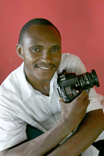
|
|

World Press Photo could not operate successfully
without its partner organizations, some large but mostly small, who work to
encourage the highest professional standards in photojournalism worldwide.
In each issue we take a look at one these partners, starting with the Flame
Tree Trust which, for six years now, has been helping develop much-needed skills
and experience in Tanzania.


|
The Flame Tree
|
The Flame Tree, commonly found in Tanzania and other tropical countries, provides shade in the blistering heat of the midday sun. In the context of the trust which bears its name, it sounds like a perfect collecting place for those of like mind.
Four such people came together in 1999 because of their concerns about “the constraints and shortcomings in their respective sectors” in Tanzania.
All media professionals – working in photography, video, film and graphic design – they were determined to bring about positive changes which would help creative people develop in their country. And so came about the Flame Tree trust.
Finalizing a strategy was relatively simple. Flame Tree wanted to train, develop and provide facilities for media-related professionals, have photography and videography included in the curricula of journalism schools, organize seminars and workshops and interest more people in photojournalism of one kind or another.
But, as one of the founding quartet, 36-year-old Abdu Simba, admits; a lack of premises for the trust could have killed the idea at birth.
“As we drifted back to the practical realities of our day jobs, Flame Tree faced a real danger of gradually fading away, or at least stagnating, through a lack of focus,” says Abdu, a business consultant and company director who returned to Tanzania after several years working in London.
“However,” he adds, “salvation came in the form of our most committed Trustee, Petra Sutila, a graphic designer with a passion for photography. Largely as a result of her efforts, Flame Tree commenced a relationship with World Press Photo that began with cooperation on World Press Photo’s traveling photographic exhibition in Tanzania.”
Adds Croatia-born Petra, who has lived in Africa for 27 of her 31 years and runs her own graphic design and photography company: “After working several years in Tanzania and seeing that there are no schools that teach photography or graphic design, I decided to do something about it”.
“An office has been established in Kawe, Dar es Salaam,” says Abdu. “It is kitted out with essential facilities and has become a meeting place for photographers and trustees alike. We continue to forge new relationships with institutions and now have the confidence to consider joint initiatives with ‘heavyweight’ organizations such as UNSECO and UNICEF.”


|
Mwanzo Millinga
|
Flame Tree continues to work with World Press Photo and its greatest achievement,
says Abdu, is a training course in conjunction with World Press Photo, run by
a leading local professional photographer Mwanzo Milinga.
"Mwanzo is crucial in our organization because he adapts and updates
modules before teaching them, " says Petra. "He understands the level
of knowledge of the photographers and uses his experience of working in Norway and Sweden. He is a great publicist for Flame Tree, encouraging young
students to come to the center and working closely with newspapers. He talks about Flame Tree on every occasion."
Together with fellow trustees, photographer Paul Joynson Hick and Laurence Price, a film, documentary and video maker, Abdu and Petra have scored a number of other successes with Flame Tree.
“They include workshops for local photographers overseen by internationally acclaimed practitioners such as Judah Ngwenya,” says Abdu. “There’s a project to save Tanzania’s National Film Archives, and the provision of technical support to the Rafiki Art Trust Fund, in conjunction with the Ford Foundation. Furthermore, relationships have been forged with a number of local and international institutions and agencies such as the Tanzanian Cultural Trust Fund and the Kuona Art Fund in Kenya.”
Flame Tree say they see a bright future. But the trustees recognize there are challenges ahead and many of them add up to the need for money.
“We have learned the hard way, that our own funds – Petra and I pay for much of the accommodation and equipment - and those of benefactors and philanthropists is not much of a long-term financing strategy”, says Abdu.
So the trustees are currently trying to raise more awareness of their activities
and cash. But what Flame Tree clearly does not lack is enthusiasm and commitment
in abundance from those who set it up and continue to run it.
|
|



Francis Lucas, Emmanuel Herman and Mohamed Hashim
at a Flame Tree seminar


Associated Press's Peter Dejong instructs during a seminar

|
|
